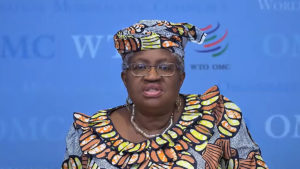
WTO Director-General Ngozi Okonjo-Iweala
We are solving problems born of success
The Global Supply Chains Forum brought together WTO members and representatives from shipping, trading, express delivery and logistics companies to share perspectives on the causes of continued supply chain disruptions and to work together on ways to mitigate their impact on global trade and post-pandemic economic recovery.
The pandemic has caused continued supply and demand pressures, congested ports, shipping logjams, rising inflation, increased freight rates and shortages that are disrupting global trade, participants underlined. The conflict in Ukraine has also led to severe disruption of supply chains particularly in grains, metals and energy products. Other factors cited by shipping lines, port officials, shippers and analysts as hampering supply chains were labour shortages, land-based bottlenecks and underinvestment in infrastructure.
In her remarks to the Forum, the Director-General noted the WTO “offers a unique forum for global dialogue on supply chain issues,” as witnessed during the ongoing pandemic, when the WTO helped governments and businesses identify bottlenecks and reduce export restrictions affecting the production and distribution of COVID-19 vaccines.
“It’s worth taking a moment to remember that the issues we are working to solve are problems born of success,” the DG said, noting that” many of the problems we were grappling with then – and now – are the result of more goods moving across borders than ever before.”
Nevertheless, “much like the WTO itself, our supply chain infrastructure needs to remain fit for purpose,” she told participants. “It is clear that equipping our supply chain infrastructure to cope better with sudden changes demands action – and investment, both public and private.”
The current system “was not built for a world where a climate disaster can interrupt factory operations worldwide, or a microscopic virus can upend the movement of goods, services and people almost overnight,” she added. “This is no case for a retreat from trade, which helps us adapt to those and other shocks.”
The Director-General said that even before the latest crisis facing global trade – the outbreak of war in Ukraine – supply chain disruptions triggered by the COVID-19 pandemic and stimulus-driven demand for goods were weighing on global trade, economic growth and price stability.
Some private sector representatives suggested that government actions which restrict the flow of goods, services and data were also contributing to sclerotic performance of global supply chains. Several participants also complained that smaller companies had less bargaining leverage and were subsequently disadvantaged in transport and logistics markets.
The supply chain disruptions jeopardize the flow of goods across the world and weigh negatively on the post-pandemic economic recovery, particularly on poor countries, small and vulnerable economies, and landlocked developing countries, they said.
Collaboration can make supply chains more sustainable and inclusive
The Forum looked into how the WTO can help strengthen global supply chains and how further collaboration among partners across regions and sectors can make supply chains more sustainable and inclusive. In addition to its monitoring function, the Director-General noted that the WTO can contribute by enhancing trade facilitation, supporting the quick clearance of goods at borders and promoting further liberalization of trade in transport and logistics services to bolster supply chain infrastructure.
“I always say that the global trading system of the 21st century needs to deliver for people everywhere,” the DG said. ” Making supply chains work better is part of that.”
The Director-General noted the supply chain crunch has hit smaller firms particularly hard, given their narrower margins and more limited financial resources. “Poor countries, small and vulnerable economies and landlocked developing countries risk being pushed out of global value chains, or finding it even harder to break into them,” she added.
Pamela Coke-Hamilton, Executive Director of the International Trade Centre, echoed the concerns of the Director-General concerning the impact on smaller firms and developing economies, which include a sharp decline in the availability of inputs, a “precipitous” decline in demand for their outputs, export barriers and reduced logistics services.
“It’s been a devastating two years for small businesses, especially in developing countries, and current events suggest we have an even more difficult few years ahead,” she said.
Participants said a broader and deeper investment in digital technology — including blockchain and robotics — is one key to reducing global supply chain congestion. Diversification of markets and investment – both public and private – are among the tools put forward by participants.
John Denton, Secretary General of the International Chamber of Commerce, cited digitalization as an issue that “must be addressed” in order to strengthen global supply chains.
“If you want resilience, you’ve got to ensure access to digital skills, but also digital platforms,” he told the Forum. “That also means you’ve got to make some bold reforms in terms of the digital economy.”
“We’re still a long way away from digitalizing trade flows,” particularly with regards to trade finance, added Victoria Claverie, Head of Trade in Europe for Standard Chartered.
Many participants stressed that all partners in global supply chains will need to work together to ensure successful decarbonization efforts are supported. Sound government policies were also crucial in this regard, according to many speakers.
Clemence Cheng, Managing Director in Europe for Hutchison Ports, said the WTO and other international organizations can contribute by serving as a knowledge bank on supply chains in order to anticipate problems earlier and encourage greater public-private sector cooperation.
Several officials stressed the importance of trade agreements in facilitating supply chains. Luz María de la Mora Sánchez, Mexico’s Undersecretary for Foreign Trade, said the WTO’s Trade Facilitation Agreement has been “key and crucial” in addressing supply chain disruptions, while Gambia’s Minister for Trade, Seedy Keita, underlined the importance of the new African Continental Free Trade Area in helping to boost trade and reduce trading costs in Africa.
Closing the event, Deputy Director-General Jean-Marie Paugam said: “No supply chain can properly operate without a global system of predictable and facilitating trading rules, such as the one the WTO operates. But these rules alone can do nothing for trade if supply chains are being physically interrupted. All constituents of the world trading system – from the private sector to governments, regulating authorities and international organizations – must now play their part in a response.”
Deputy Director-General Anabel González – who also closed the Forum – said that enhanced global trade will help strengthen global supply chains and called on the global community to coordinate actions “to equip supply chains to deal better with growing threats and rising uncertainty.”
The event can be viewed here.
More information on the event – including the full list of speakers – can be found here.
The Forum was preceded by a meeting between DG Okonjo-Iweala and representatives from over 20 governmental and private sector organizations, including the Association of Southeast Asian Nations, the Global Shippers Alliance, Hutchison Ports, IKEA, the International Air Transport Association and PSA International.
Source: World Trade Organization


